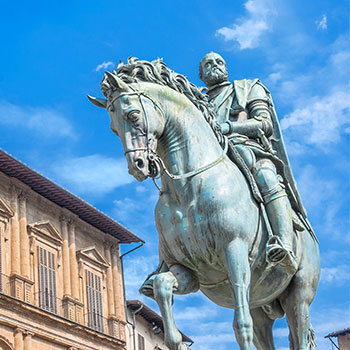Cinema & the City: Cinematic Representations of Florence
Social Sciences & Cultural Studies Program
Florence, Italy
Dates: 1/7/25 - 4/26/25

Cinema & the City: Cinematic Representations of Florence
OVERVIEW
CEA CAPA Partner Institution: CEA CAPA Florence Center
Location: Florence, Italy
Primary Subject Area: Film Studies
Other Subject Area: Cultural Studies
Instruction in: English
Course Code: FLM375FLR
Transcript Source: University of New Haven
Course Details: Level 300
Recommended Semester Credits: 3
Contact Hours: 45
Prerequisites: None
DESCRIPTION
Since the beginning of the nineteenth century, cities and cinemas have been connected on many different levels: thematically, formally, and industrially. Cinema has always been interested in the representation of the city-life style as well as the human and social conditions it presents. As such cinema, has also greatly focused on the representation of the spatial complexities inherent in cities. Moreover, the city has always been the location for cinema production, distribution and exhibition.
Florence - with its historical buildings, narrow streets and its beautiful scenery - has been used by filmmakers from all around the world over the last sixty years. This course will focus mainly on the representation of Florence as a city in both Italian and Anglo-American movies, and it will explore the main themes and the different forms addressed and used by directors. The course will also draw comparisons between the "internal" and "external" cinematic gaze on the city - that is - between the Italian and the foreign representations of it.
Beginning with the Anglo-American visions of Florence that stem from the historical Grand Tour, the course will analyze movies such as A Room with a View, The Portrait of a Lady, Tea with Mussolini, Romola, and September Affair. It will explore the ways in which these non-Italian directors represent Florence as a place of beauty, art, seduction, and romanticism by focusing their cameras on the streets, buildings, artistic features, and scenery of the city, using these to exemplify the main character's personal journey and growth. Beneath its artistic and suggestive beauty however, lurks a different reality that confers a Janus-like face to Florence. Its history, in fact, bestows the city an aura of darkness and mystery upon which the external eyes have largely dwelled, producing movies such as Obsession, Hannibal, and Inferno.
From here, the course will examine Italian-made movies, revealing a different perspective. Italian directors rarely seem so fascinated by the elements mentioned above. Rather, they tend to explore different aspects of the city, allowing them to examine and reveal its society as well as its cultural and political elements. Movies like La vita è bella, Le ragazze di San Frediano, La meglio gioventù, Amici Miei present a Florence that is poorer, more grim (despite the humor), and more complex.
The course will provide students with an interdisciplinary framework that brings together Film Studies, Sociology, and Cultural Studies. It will take students not only on a metaphorical journey but also a physical one as students leave the classroom and take to Florentine streets, exploring the different locations where the movies were shot to better understand the spatial complexities of the city and the various forms and levels of cinematic representations.
Florence - with its historical buildings, narrow streets and its beautiful scenery - has been used by filmmakers from all around the world over the last sixty years. This course will focus mainly on the representation of Florence as a city in both Italian and Anglo-American movies, and it will explore the main themes and the different forms addressed and used by directors. The course will also draw comparisons between the "internal" and "external" cinematic gaze on the city - that is - between the Italian and the foreign representations of it.
Beginning with the Anglo-American visions of Florence that stem from the historical Grand Tour, the course will analyze movies such as A Room with a View, The Portrait of a Lady, Tea with Mussolini, Romola, and September Affair. It will explore the ways in which these non-Italian directors represent Florence as a place of beauty, art, seduction, and romanticism by focusing their cameras on the streets, buildings, artistic features, and scenery of the city, using these to exemplify the main character's personal journey and growth. Beneath its artistic and suggestive beauty however, lurks a different reality that confers a Janus-like face to Florence. Its history, in fact, bestows the city an aura of darkness and mystery upon which the external eyes have largely dwelled, producing movies such as Obsession, Hannibal, and Inferno.
From here, the course will examine Italian-made movies, revealing a different perspective. Italian directors rarely seem so fascinated by the elements mentioned above. Rather, they tend to explore different aspects of the city, allowing them to examine and reveal its society as well as its cultural and political elements. Movies like La vita è bella, Le ragazze di San Frediano, La meglio gioventù, Amici Miei present a Florence that is poorer, more grim (despite the humor), and more complex.
The course will provide students with an interdisciplinary framework that brings together Film Studies, Sociology, and Cultural Studies. It will take students not only on a metaphorical journey but also a physical one as students leave the classroom and take to Florentine streets, exploring the different locations where the movies were shot to better understand the spatial complexities of the city and the various forms and levels of cinematic representations.








